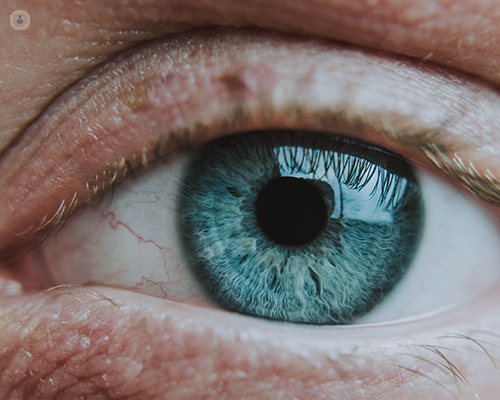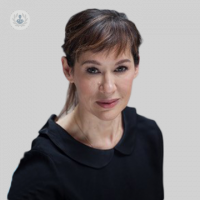I've just had cataract surgery; do I have cystoid macular edema?
Escrito por:Cystoid macular edema, also called CME or CMO, is a complication that often follows cataract surgery. With an average incidence of one to four per cent, it is the most common post-operative cause of vision loss in patients who have been operated on cataracts.
In this article, leading ophthalmologist, Ms Theresa Richardson, explains what causes CME, what are the different treatment options, and why CME is often confused with other eye conditions.

What causes cystoid macular edema?
CME occurs when pockets of fluid accumulate in the fovea (the centre of the retina), causing the area to thicken, similarly to a sponge. As a result, your eyesight becomes blurry, almost like looking through water. Sometimes, there is a very small amount of fluid, which can only be detected by an OCT (scan of the retina).
People with diabetes are more likely to develop this condition, but patients who undergo cataract surgery are especially at risk if there were complications during the procedure.
How is cystoid macular edema diagnosed?
In most cases, CME is diagnosed in the first post-operative visit after a cataract surgery – four weeks later – but it can be earlier. The degree of severity can vary from mild to serious.
It is very important to diagnose CME correctly, because patients can often confuse the signs of CME with those of wet macular degeneration, a more serious eye condition which needs urgent treatment. However, wet macular degeneration is a completely different condition caused by the bleeding of the blood vessels located under the retina. We usually are able to make an accurate diagnosis just by looking at the OCT and the appearance of the retina, but if there is doubt, an OCTA (detailed scan of the retina) might be needed.
What is the treatment for cystoid macular edema?
The treatment for a large macular edema is Nepafenac NEVANAC 1 mg/ml eye drops, taken three times a day for six weeks plus, or minus dexamethasone drops 0.1%. This is a non-steroidal drug, but it is administered in drops so it shouldn’t cause stomach upsets.
What is the prognosis for cystoid macular edema?
Treatment isn’t needed for the majority of cases that are seen at two to four weeks (with a 6/9 – 6/12 vision) because they will heal on their own. For the rest, it is standard to wait six weeks to see if there is a response to treatment, but follow up time may be reduced in the presence of large quantities of edema.
We offer an injection of steroid solution under the eye with depomedrone or triamcinolone 40mg if, after several weeks of treatment, the edema hasn’t reduced considerably. This is a safe procedure involving a very small risk of raised pressure in the eye – probably less than 1/100 – which can easily be treated. After the injection, you may have a bruise under the eye, which can sound daunting but it is actually quite painless.
There is an 80-89% possibility that the steroid solution will help, but in the case that it doesn’t, we offer another, more direct injection, called Ozurdex, for the cavity of the eye. This is a very effective method to treat CME, but it has a 10% chance of raising eye pressure and a 1/1000 risk of causing infection or retinal detachment.
Other interventions that may be necessary include surgery or laser to remove the vitreous that is occasionally trapped in the wound, and washing out the remnant of the cataract. This could happen if a part of the cataract was left in the eye, or caused by the inflammation of the lens, due to surgery complications where it couldn’t be placed behind the iris, or if the lens was inserted in a different place, such as the front of the iris (the coloured part of the eye).
What is your advice for patients who develop cystoid macular edema?
I would tell them not to worry. CME is a common condition, and 96% of patients will recover from it in a year.
The interventions aren’t strenuous or frightening and the ophthalmologist will make sure to give you the correct diagnosis.
Ms Theresa Richardson is a highly esteemed ophthalmologist based in London, who specialises in cataracts, macular degeneration, and diabetic retinopathy. If you’re looking for expert diagnosis of CME, or are worried about another eye condition, visit Ms Richardson’s Top Doctors profile today.


